MercoPress. South Atlantic News Agency
Tag: Spain
-
Thursday, March 10th 2016 - 03:59 UTC
Spain's Socialists would continue “dialogue and friendship” with Gibraltar even with Brexit
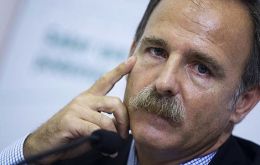
Spain’s Socialist party would continue to advocate “dialogue and friendship” with Gibraltar even if the UK voted to leave the European Union, the PSOE’s MP for Cádiz said during a visit to the Rock.
-
Saturday, March 5th 2016 - 08:52 UTC
Spain will bring up the issue of Gibraltar, 'the very next day' UK votes to leave European Union
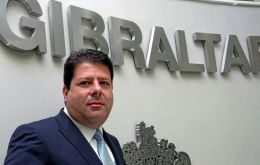
The caretaker Spanish Foreign Secretary, Jose Manuel Garcia Margallo, has declared that he will bring up the question of Gibraltar ‘the very next day’ if the UK votes to leave the European Union on 23rd June. The interview has been described by the Chief Minister Fabian Picardo as an example of why it's so much more important for Gibraltar to remain in Europe.
-
Friday, February 26th 2016 - 07:05 UTC
Britain protests 'provocative' incursion in Gibraltar waters by Spanish corvette

Britain has protested to Spain after a Spanish warship “manoeuvred dangerously” during an incursion into British Gibraltar territorial waters, risking collision with a Royal Navy patrol boat.
-
Monday, February 1st 2016 - 07:00 UTC
Spanish scientists analyze European and veined squid diets
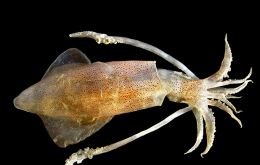
A group of Spanish scientists has analyzed for the first time the European and veined squid diet in the Mediterranean. European squid (Loligo vulgaris) and veined squid (Loligo forbesii) are two morphologically nearly identical species that inhabit the Atlantic Ocean and the Mediterranean.
-
Wednesday, January 20th 2016 - 07:57 UTC
Teheran and Spain discussing an Iranian refinery in Algeciras, across from Gibraltar
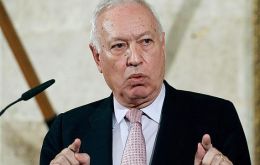
The governments of Spain and Iran are discussing the possible construction of an Iranian-owned refinery in Algeciras, Spain and across from Gibraltar, after the Islamic Republic re-opens for business following the lifting of international sanctions.
-
Saturday, January 16th 2016 - 07:32 UTC
UK confident of positive side for Gibraltar of Spanish royal family visit to UK

The visit by the Spanish Royal family to the United Kingdom, scheduled for March, will celebrate and strengthen the ties between both countries. This according to the British Ambassador in Madrid, Simon Manley, who highlighted the existing co-operation between the law enforcement agencies in Spain and Gibraltar.
-
Friday, January 15th 2016 - 07:31 UTC
Departing Spanish minister joins Argentine bandwagon claiming 'Malvinas dialogue'
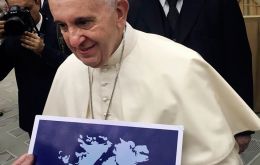
Spanish Foreign Secretary Jose Manuel Garcia Margallo has delivered what could possibly be his last comment on Spain’s claim to Gibraltar’s sovereignty in his current role. The official has jumped on the bandwagon of a new Argentine platform seeking international support for the return of the Falkland Islands and urging UK to agree to bilateral talks over Gibraltar’s sovereignty.
-
Thursday, January 14th 2016 - 06:33 UTC
Socialist becomes Spain's parliament speaker; no agreement yet on new government

Spain's parliament held its first session Wednesday, with lawmakers from four main parties taking their seats at a time of political turmoil. Lawmakers picked a Socialist, Patxi Lopez, a former head of the regional government of the northern Basque Country, as parliamentary speaker, in the first pact between rival parties still engaged in talks to form a government since last month's inconclusive election.
-
Thursday, January 14th 2016 - 06:24 UTC
Gibraltar logged 431 Spanish vessels' incursions into territorial waters

The number of unlawful incursions by Spanish state vessels into British Gibraltar territorial waters rose last year compared to 2014. But the number of serious incidents tailed off in the final months of 2015 against the context of diplomatic efforts to increase cooperation at sea, according to a report published in the Gibraltar Chronicle.
-
Monday, January 11th 2016 - 14:13 UTC
Agreement in Catalonia puts more pressure on Madrid for a grand coalition

A fiercely secessionist leader was elected president of the wealthy region of Catalonia thanks to a last-minute show of unity, giving fresh impetus to attempts to break away from Spain after months of infighting. The appointment of Carles Puigdemont, just hours before a deadline which would have forced fresh regional elections, drew an immediate rebuke from Spanish Prime Minister Mariano Rajoy.
